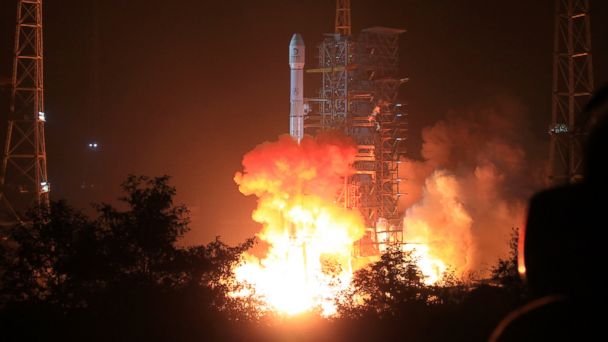China Launches Mission to Rove the Moon

Credit: Li Gang/XinhuaAP Photo
A rocket blasted off from its base in southwest China early Monday carrying the country's first-ever robotic lunar rover. It is China's most ambitious space mission to date, and part of the ruling Communist party's narrative of national power and scientific mastery.
The Chang'e-3 probe is carrying a lunar rover called the Yutu, or Jade Rabbit, named after the mythical pet of Chang'e, the Moon Goddess. The probe and rover were launched from the Xichang Satellite Launch Center in southwestern Sichuan province.
The Chang'e-3 three-month mission is to land on the moon, rove around and collect soil samples. If all goes smoothly, China will become only the third country after the US and former Soviet Union to put a rover on the moon.
"The probe has already entered the designated orbit," the official Xinhua News Agency quoted launch center director Zhang Zhenzhong as saying, as he declared the launch a success to an applauding audience.
The Yutu rover is expected to land on the moon on December 14, at a landing site called the Sinus Iridium (The Bay of Rainbows). During its time on the moon, Yutu will explore the lunar surface, conduct geological surveys and search for natural resources within a 3-square-kilometer area. It will travel a maximum distance of 10 kilometers from the landing site. It is also able to transmit real-time video while digging and analyzing soil samples.
China established its lunar orbiter project in 2004 with the program "Project Chang'e." In 2007, it launched its first moon orbiter, the Chang'e-1. And in 2010, Chang'e 2 was launched to survey the moon's north and south poles and take high-resolution pictures of the chosen landing site for Chang'e-3.
Chinese scientists are working on sending a human being to the moon sometime after 2020, and on constructing a working space station by that time.
China's military plays an important role in the country's space program, which contributes to scientific research, commercial applications such as satellites, and military applications. Fearing that China might steal information for its space and missile programs, the US Congress passed a bill in 2011 which bans NASA from bilateral cooperation with China on space research.
According to Reuters, China pledges to share the technological achievements of its manned space program with other nations, especially developing ones, and will offer to train astronauts from other countries.
President Xi Jinping has said he wants China to establish itself as a major power in space. China's space program has produced plentiful imagery of state power, military prowess and technological achievement that mesh with Xi's pursuit of a "Chinese Dream."